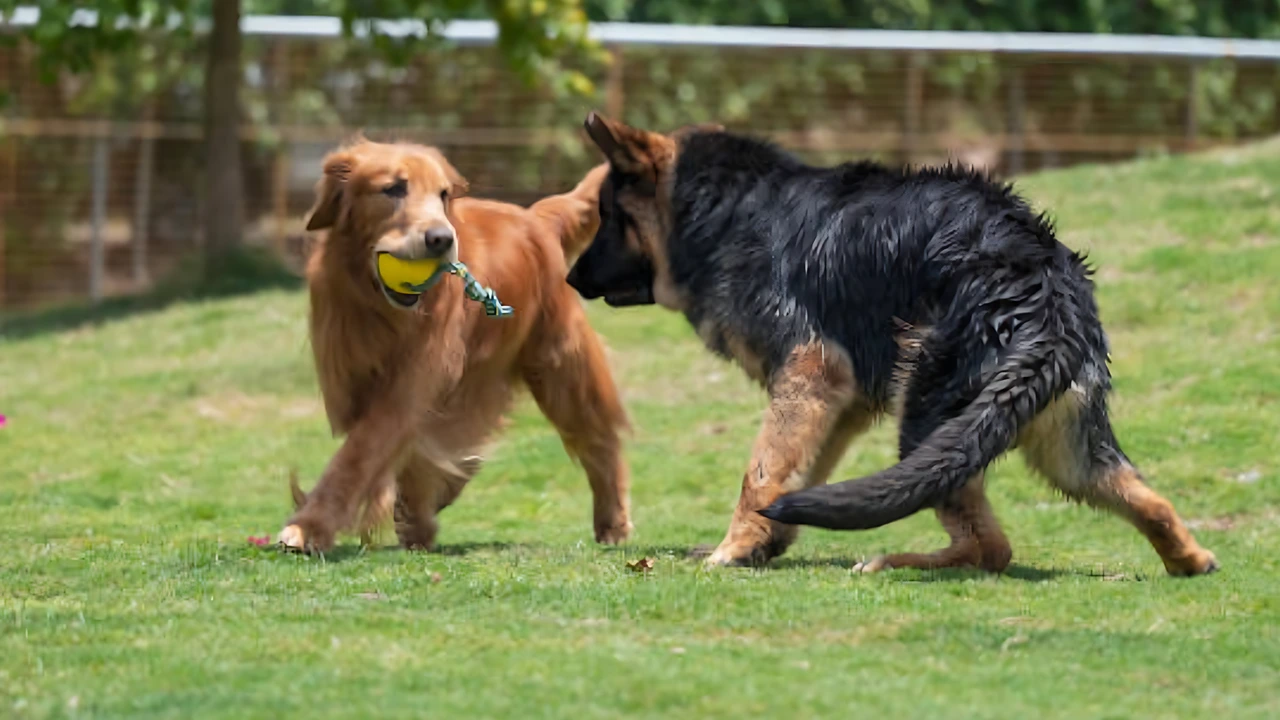TL;DR — How to Treat Your Yard for Dog Worms and Parasites
Dog worms and intestinal parasites can survive in soil long after an infected pet has passed stool outdoors. Eggs and larvae from roundworms, hookworms, whipworms, and tapeworms can contaminate your yard and reinfect pets if left untreated. Protecting your dog means treating both your pet and their environment with safe, consistent parasite control.
Key Points:
- Dog worms are parasites that spread through contaminated poop, soil, fleas, or contact with infected animals.
- Common types include roundworms, hookworms, tapeworms, whipworms, and heartworms (spread by mosquitoes).
- Yards can harbour parasite eggs for months or years, making reinfection likely if not cleaned properly.
- Pick up dog poop immediately — worm eggs in feces are a primary source of contamination.
- Safe yard treatments: food-grade diatomaceous earth, beneficial nematodes, or vet-approved products help reduce eggs/larvae.
- Prevention matters: keep grass short, ensure drainage, and block wildlife/rodent access.
- Regular deworming is essential: combine vet-prescribed medication with yard hygiene for full protection.
- Watch for symptoms: diarrhea, weight loss, bloated belly, scooting, or visible worms in stool/vomit.
When in doubt, consult your veterinarian. Treating both your dog and your yard creates a safer, parasite-free environment for pets and family.
Are you worried that your yard might be harbouring harmful dog worms and intestinal parasites? When a dog passes stool outdoors, worm eggs from roundworms, hookworms, or whipworms can contaminate the soil and pose a risk to any dog or cat that comes into contact with it. These microscopic parasites can survive in contaminated soil and infect dogs that ingest the eggs or larvae while exploring their yard.
Many dogs become infected without showing immediate signs, making regular preventive care and awareness essential for every pet parent. Puppies are especially vulnerable, and parasites like tapeworms can also be transmitted through fleas or from ingesting infected fecal material. If left untreated, these internal parasites can cause serious health issues in your pet’s intestinal tract.
To protect your pets and your yard, it’s important to understand how worms are transmitted and how infestations spread through feces. Your veterinarian may recommend a stool sample test, prescribe dewormers, or suggest yard-safe treatments to help eliminate parasite eggs. Keep reading to learn how to treat your yard effectively and stop worms before they infect your pets again.
How Do Dogs Get Worms
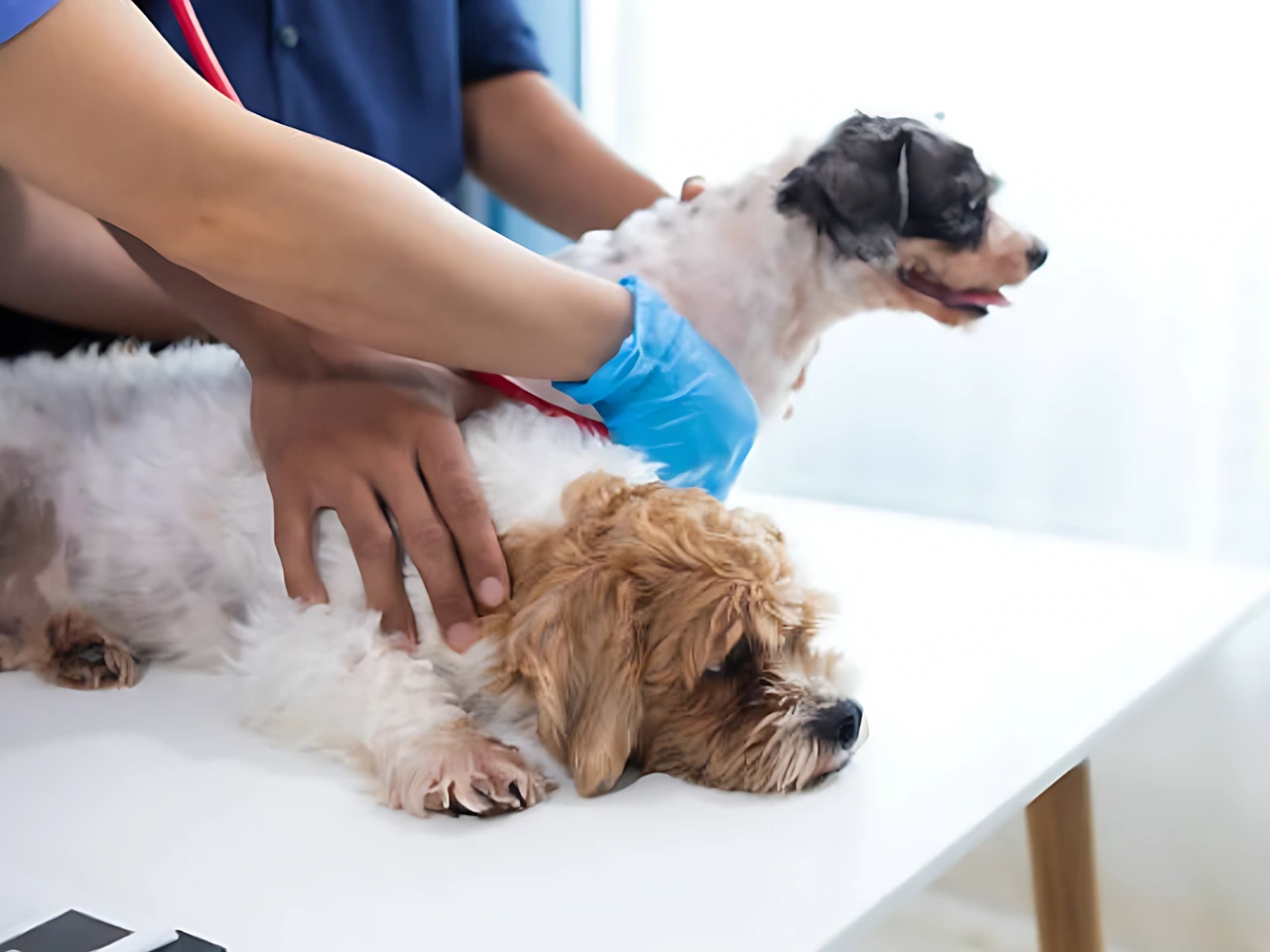
Dogs can become infected with intestinal parasites and parasitic infections through various routes depending on the type of parasite. Knowing how these infections occur is essential for pet owners to effectively protect their pets and manage parasite control.
Ingesting Contaminated Feces
The most common way dogs get worms is by ingesting worm eggs present in infected dog’s stool or fecal material (dog’s poop). These microscopic parasite eggs are shed in the stool or vomit of an infected dog and can survive in areas of the yard or contaminated soil for long periods. Dogs may ingest these eggs by:
- Sniffing or licking contaminated dog’s stool while exploring outside
- Accidentally eating worms in dog poop left by themselves or other infected animals during walks or playtime
Transmission from Mother to Puppy
Puppies can become infected with parasites from their mother through several pathways:
- Larvae can cross the placenta before puppies are born, causing early parasitic infection
- Puppies can also ingest larvae through their mother’s milk while nursing, making it important for a vet to check and deworm both mother and puppies early on
Eating Raw or Undercooked Meat and Prey
Certain parasitic worms, such as some tapeworms, infect dogs when they eat raw or undercooked meat. These parasites:
- Form cysts in muscle tissue of prey or livestock animals
- Become active inside the dog’s intestinal tract, live in the intestinal lining, and mature into adult worms
Through External Parasites Like Fleas
Some parasites rely on intermediate hosts. For example:
- Tapeworm segments, which look like grains of rice or segments of the tapeworm, develop inside fleas
- Dogs get tapeworms when they accidentally swallow fleas while grooming or scratching itchy skin
- Flea infestation is a common cause of tapeworm infections in dogs
Penetration Through the Skin
Hookworm larvae found in contaminated soil or dog’s poop can infect dogs by:
- Burrowing through the dog’s skin, often on the paws or belly where there is contact with the ground
- Migrating through the bloodstream to the intestinal tract where they mature and reproduce
Ingesting Contaminated Water or Soil
Dogs can also become infected by:
- Drinking from stagnant water or puddles contaminated with worm eggs or larvae
- Digging in or licking areas of the yard where parasite eggs are present in the soil
Eating Rodents or Wild Animals
Dogs that hunt or scavenge wildlife may ingest parasites carried by these animals, such as:
- Larval stages of lungworms or other less common worms, which can infect dogs
Contact with Other Infected Dogs
Parasites can be transmitted through:
- Close contact with infected dogs in places like dog parks or kennels
- Ingesting fecal material or coming into contact with contaminated fur or surfaces
In Utero and Perinatal Transmission
Beyond placental transfer, puppies can become infected during or shortly after birth through:
- Contact with infected birth canal tissues
- Nursing from a mother dog with an active parasitic infection
Via Contaminated Objects
Parasite eggs or larvae can survive on household or outdoor items. Dogs can become infected by:
- Licking or chewing toys, bedding, or grooming tools contaminated with fecal material or worm eggs
- This is why parasite prevention and regular cleaning are vital for pet owners
Common Types of Worms in Dogs

Several types of parasitic worms are common in dogs and can cause a range of health issues if left untreated. Knowing the differences can help pet owners recognize symptoms and seek timely care from a vet.
Roundworms
- These are one of the most frequently seen in dogs, especially puppies.
- Roundworms look like spaghetti and can be several inches long.
- They live in the intestinal tract and absorb nutrients, causing weight loss and poor coat condition.
- Puppies often get roundworms through their mother before birth or through her milk.
- Roundworm eggs are passed through the stool or vomit and can contaminate areas of the yard.
Tapeworms
- Tapeworms are flat, segmented worms that look like grains of rice or segments of the tapeworm in the dog’s stool or around the anus.
- Dogs get tapeworms primarily by ingesting fleas during grooming if they are infested with tapeworms or fleas.
- The parasite lives in the intestinal tract but requires a flea or rodent as an intermediate host.
- Tapeworm segments are often visible without a microscope, but a vet can confirm diagnosis.
Hookworms
- Hookworms are small but dangerous parasites that live in the intestinal lining and suck blood, leading to anemia.
- These worms can infect dogs through contact with infected soil or dog’s poop containing larvae that burrow through the skin.
- Hookworms can be especially harmful to puppies and dogs with weakened immune systems.
Whipworms
- Whipworms are less common but still seen in dogs and passed through the feces.
- They live in the intestinal tract and cause diarrhea, weight loss, and anemia.
- Because whipworm eggs are tough, they can survive for years in the environment, making parasite prevention crucial.
Heartworms
- Unlike intestinal worms, heartworms are transmitted by mosquitoes and affect the heart and lungs.
- Heartworms can be life-threatening and require specific testing and treatment by a vet.
- Heartworm prevention is a key part of responsible parasite control.
How Worms Affect Dogs
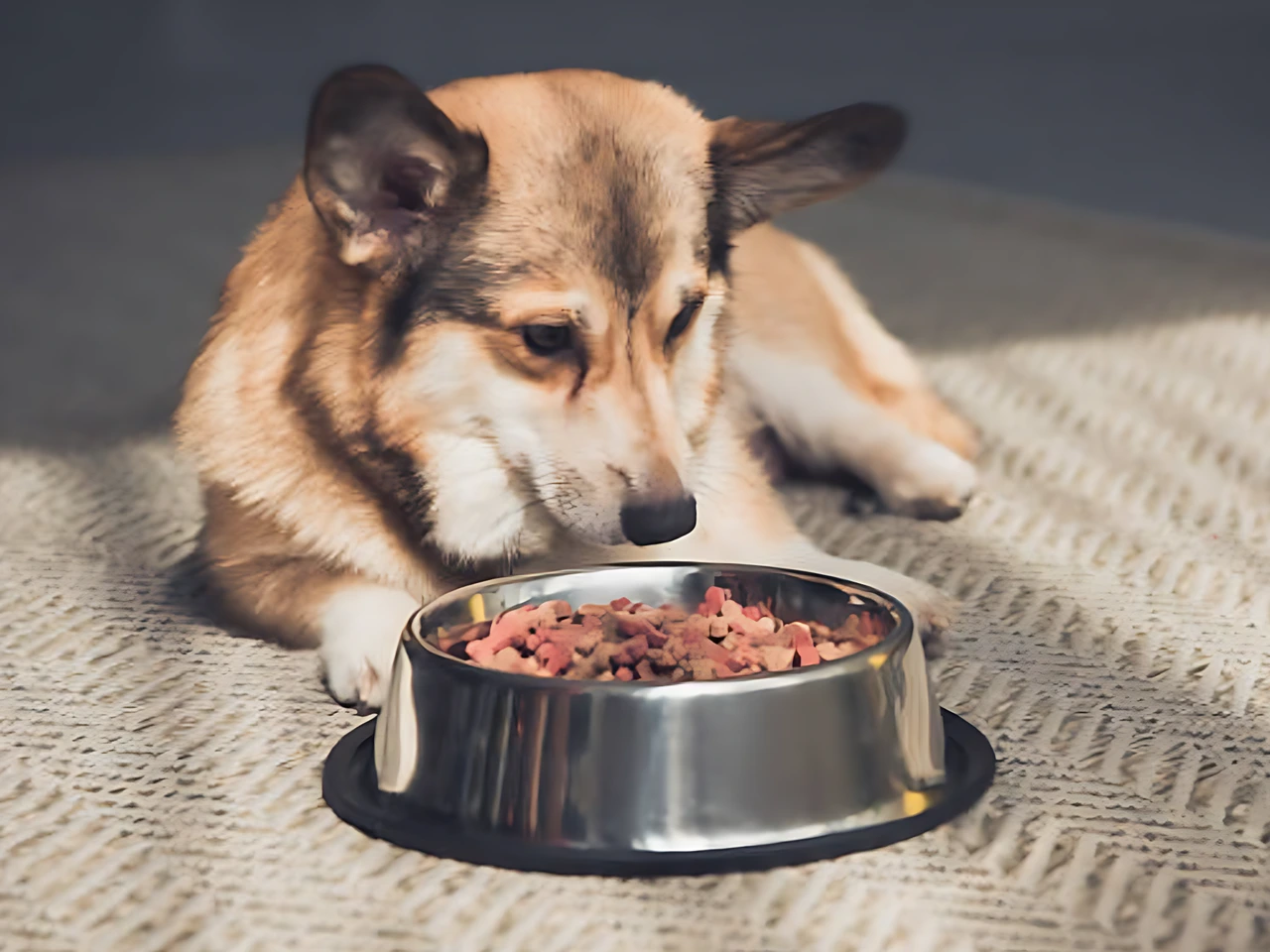
Worms may cause a wide range of physical and internal issues in dogs depending on the type and severity of the parasitic infection. When a dog is infected with worms, the parasites live in the intestinal tract or other organs and can interfere with the dog’s health in several ways:
Digestive Distress
- Worms in the intestines can cause vomiting, diarrhea, gas, and bloating.
- Worms may appear in the stool or vomit, especially roundworms that look like spaghetti and are often several inches long.
- Tapeworms are also common in dogs and may appear as grains of rice or segments of the tapeworm in the dog’s stool or around the anus.
Nutrient Loss and Weight Issues
- The parasite lives by absorbing nutrients that the dog needs, leading to malnutrition.
- This results in weight loss, dry coat, lack of energy, and stunted growth in puppies.
Blood Loss and Anemia
- Some worms, like hookworms, feed on blood. Over time, this can lead to anemia, especially in puppies or small dogs.
- Signs of anemia may include pale gums, weakness, and fatigue.
Internal Organ Strain
- In some cases, worms migrate beyond the intestines and may damage the lungs, heart, or liver.
- Heartworms in particular travel to the heart and lungs, affecting breathing and cardiovascular function.
Visible Physical Changes
- A dog infected with worms may develop a distended belly or "pot-bellied" appearance.
- You may notice the dog scooting or licking the rear frequently due to irritation caused by worms in dog poop or around the anus.
Behavioural and Energy Changes
- Infected dogs often show signs of restlessness, irritability, or low activity.
- Lack of nutrients and internal discomfort may cause changes in mood and sleep patterns.
Parasite Shedding
- Eggs and larvae are often passed through the feces, continuing the parasitic life cycle.
- These eggs are microscopic and require an examination underneath a microscope, but visible worms or segments may still be seen when your dog goes to poop.
Tips to Prevent Worms in Dogs
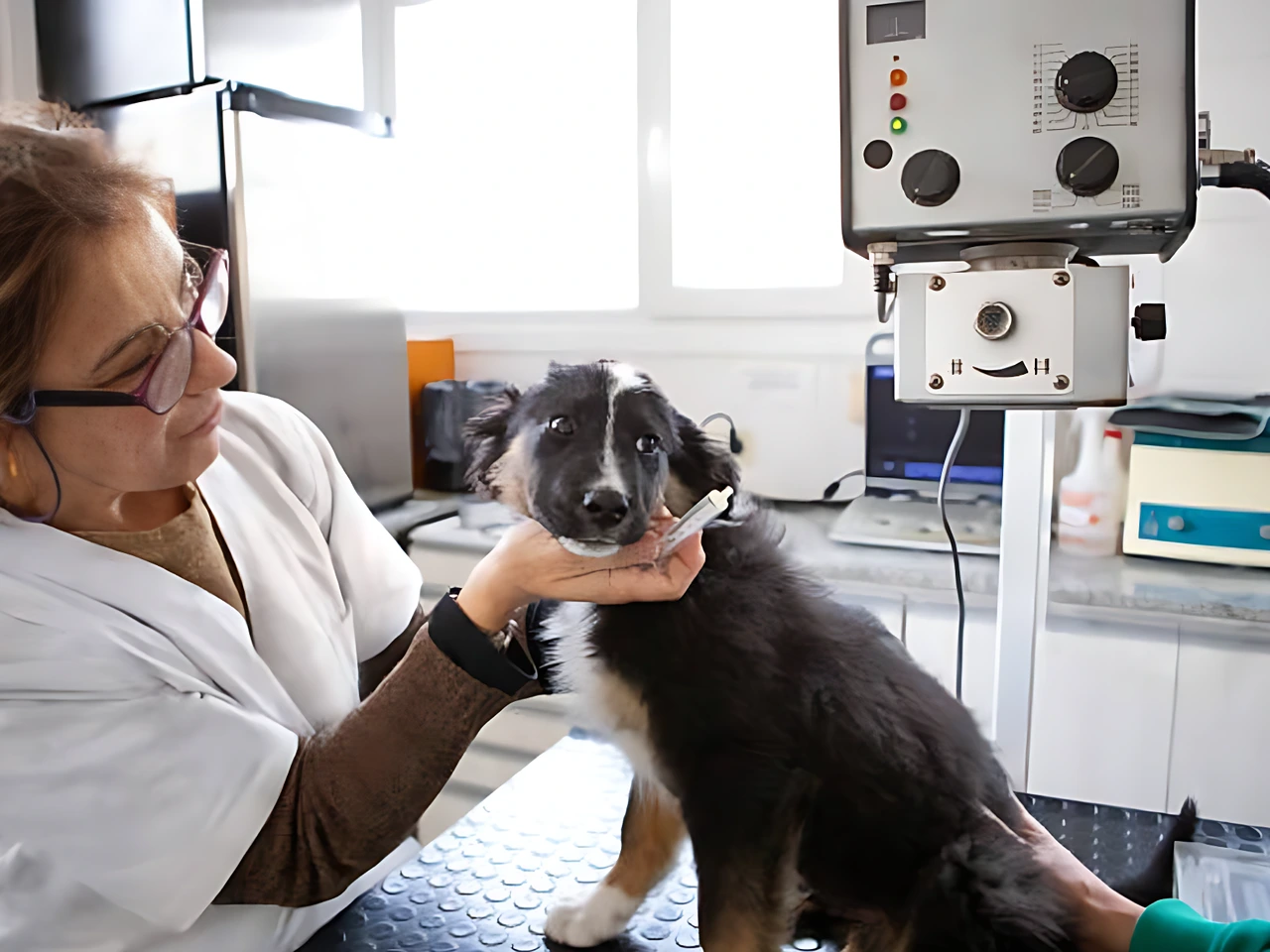
Preventing worms in dogs is a key part of responsible parasite control. Following simple, consistent steps can help you treat and prevent parasitic infections without harming your dogs.
Use a Vet-Recommended Dewormer
- Speak with your vet about the best dewormer for your dog’s age and health.
- Dogs should be dewormed regularly to remove intestinal parasites that may not show visible symptoms.
- Different types of worms may require specific treatments, so professional guidance is essential.
Get Your Dog Tested for Parasites
- A fecal exam is used to detect worm eggs and larvae under a microscope to look for infections not visible to the eye.
- Get your dog tested at least once or twice a year, especially if worms are common in dogs in your area.
- Early detection helps treat and prevent the spread of parasites effectively.
Quickly Clean Up After Your Dog
- Quickly clean up after your dog goes to the bathroom to keep the area sanitary.
- Worm eggs are often passed through the feces and can remain in areas of the yard, making re-infection possible.
- Frequent cleaning reduces the risk of your dog getting parasites or other animals becoming infected.
Avoid Risky Environments
- Limit exposure to areas where infected animals may have defecated, such as crowded dog parks or unclean trails.
- Dogs can become infected with a parasite by sniffing or licking contaminated ground or feces.
- Preventing your dog from ingesting unknown substances outside lowers the chance of a parasitic infection.
Keep Food and Water Safe
- Ensure your dog’s food and water are stored and served in clean containers.
- Avoid feeding raw meat, which may carry parasites your dog may ingest.
- Some pet owners use diatomaceous earth as a natural supplement for internal parasite control, though a vet should always approve its use.
Control Fleas to Prevent Tapeworms
- Dogs can get tapeworms when they accidentally ingest fleas during grooming.
- Keep up with flea treatments and check bedding, toys, and grooming tools regularly.
- If your dog becomes infested with tapeworms or fleas, visible segments of the tapeworm may appear like grains of rice in your dog’s poop or around the anus.
Watch for Signs of Worms
- Look out for worms in dog poop, worms in stool or vomit, or anything that looks like spaghetti and could be several inches long.
- If you notice rice in your dog’s stool or any irregular signs, take your dog to the vet for examination.
- Tested for parasites early means quicker treatment and less harm to your pet.
Some Natural Ways to Worm Prevention and Treatment

Using natural remedies can be a gentle and effective way to help eliminate worms in dogs. These options support your pet’s health without harsh chemicals.
- Turmeric: Turmeric’s anti-inflammatory and antibacterial compounds help eliminate worms and repair gut damage. Mix with coconut oil to improve absorption before feeding.
- Apple Cider Vinegar: Raw, organic apple cider vinegar increases intestinal alkalinity, making it hostile to worms. Add ¼ to 1 tsp daily to your dog’s water for parasite support and coat health.
- Chamomile: Chamomile soothes inflammation caused by parasites and can target roundworms and whipworms. Use a tincture at 0.25–0.5 ml per 20 lbs of body weight twice daily for two weeks.
- Pumpkin Seeds: These seeds contain cucurbitacin, which paralyzes worms so they can be expelled easily. Feed one teaspoon of raw, unsalted seeds per 10 pounds of body weight twice daily, either whole or ground.
- Coconut: Dried coconut acts as a vermifuge to help clear worms. Sprinkle on food: 1 tsp for small dogs, 2 tsp for medium, and 1 tbsp for large dogs. Coconut oil also aids in parasite control.
- Carrots: Coarsely chopped carrots help scrape the stomach and intestines, removing mucus and parasites while providing vitamin A and immune support. Serve as a treat or mix with meals.
How to Treat Your Yard for Dog Worms
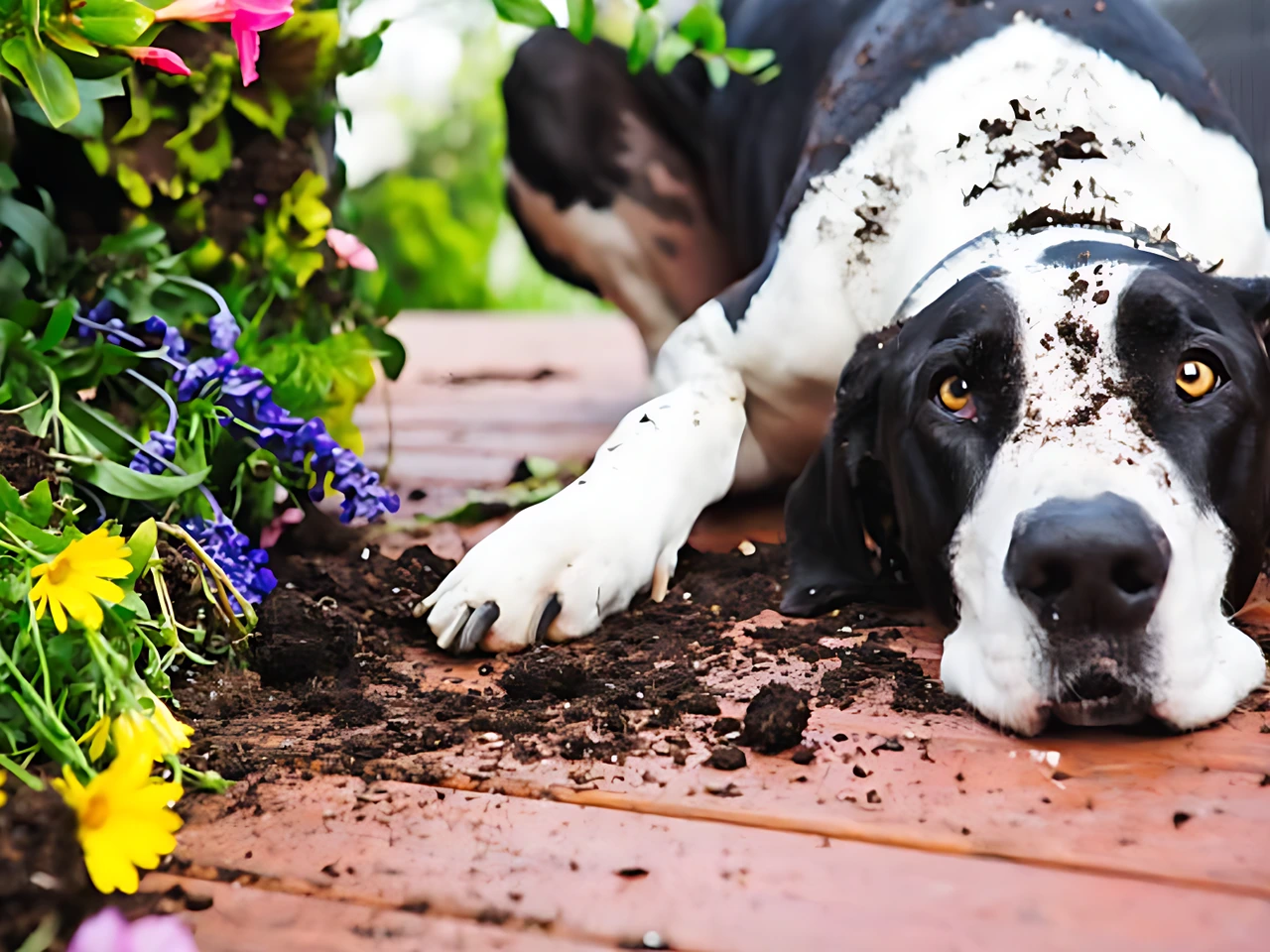
Treating your yard is key to reducing the risk of parasitic infections in dogs. Since worms may be transmitted through contact with contaminated soil or feces, keeping your outdoor area clean helps prevent your dog from becoming infected.
- Pick Up Dog Poop Immediately: Clean up your dog’s poop right after your dog goes to the bathroom. Parasite eggs and larvae are passed through infected stool and can survive in soil for a long time. Removing fecal material from the yard is an important step for every pet owner’s health responsibility.
- Use Safe Yard Treatments: Applying food-grade diatomaceous earth helps break down parasite eggs and larvae in the soil without harming your dog. Always choose treatments that are safe for pets and avoid harsh chemicals.
- Keep Grass Short and Dry: Parasite eggs thrive in moist, shaded areas. Keeping grass trimmed and removing debris reduces places where eggs and larvae can survive. Good drainage also helps prevent standing water, a parasite breeding ground.
- Limit Wildlife and Rodent Access: Dogs can get worms by ingesting infected rodents or wildlife. Securing trash and removing food sources keeps wild animals out and lowers the risk of parasite transmission.
- Prevent Recontamination: If your dog is infected and being dewormed, keep cleaning your yard to avoid reinfection. Disinfect hard surfaces with pet-safe cleaners and rotate your dog’s outdoor areas.
- Monitor and Maintain Cleanliness: Regularly check your yard for feces or other sources of parasite eggs. Rinse your dog’s paws after outdoor play to reduce the risk of getting parasites.
Final Thoughts
Effectively managing worms in dogs requires a two-pronged approach: treating the dog directly and addressing the environment where they live. Regular deworming medication prescribed by your veterinarian will help eliminate existing parasites inside your dog’s body, protecting their health and comfort. However, simply treating your dog isn’t enough, worms often reinfect pets through contaminated soil, feces, or other environmental factors.
That’s why maintaining a clean yard is crucial. Regularly removing pet waste, treating the soil if necessary, and discouraging wildlife or stray animals from entering your yard can significantly reduce the risk of your dog picking up worms again. By combining these strategies, ongoing treatment for your dog and proactive yard maintenance, you create a safer, healthier environment that protects your dog from worms now and in the future.
Frequently Asked Questions
How can I effectively treat my yard to prevent dog worms and keep my pet safe?
Treating your yard helps reduce the risk of dog worms and keeps your pet healthier:
Yard cleaning: Remove dog feces promptly to stop worm eggs from contaminating the soil.
Lawn maintenance: Keep grass short and clear away leaves or debris where worms can thrive.
Safe treatments: Use veterinarian-recommended nematodes or other pet-safe products to kill parasite larvae in the soil.
Restricted access: Limit your dog’s exposure to known contaminated areas until treatment is complete.
What natural or chemical treatments are safe to use in my yard to eliminate dog worms?
There are several options for safely treating your yard against dog worms:
Natural treatments: Beneficial nematodes are microscopic worms that prey on parasite larvae and are safe for pets and plants.
Chemical options: Pet-safe insecticides may be used but only with strict adherence to label instructions to avoid harm.
Avoid harsh chemicals: Stay away from pesticides that are toxic to pets or wildlife.
Consult your vet: Always ask your veterinarian before applying any product to your yard for safety guidance.
How often should I treat my yard to control and prevent worm infestations in dogs?
The frequency of yard treatment depends on environment and exposure risks:
Warm months: Treat every 4 to 6 weeks during spring and summer when worms are most active.
Cooler/dryer seasons: Less frequent treatments may be needed if worm activity is low.
Ongoing cleaning: Regular removal of feces can reduce the need for frequent treatments.
Complement with deworming: Combine yard treatments with your dog’s routine deworming schedule for maximum protection.
Are dog worms a type of parasite?
Yes, dog worms are parasites that live off your dog’s body and can cause health problems:
Common worms: Roundworms, hookworms, tapeworms, and whipworms are the most frequent parasites in dogs.
Health impact: These worms can cause digestive issues, anemia, and other complications if untreated.
Transmission: Worm eggs can be found in contaminated soil or feces and infect your dog when your dog ingests them.
Importance of prevention: Knowing worms are parasites highlights why yard and pet hygiene is critical.
Under what conditions can intestinal worms in dogs pose serious or fatal risks?
Intestinal worms can become dangerous in certain situations:
Heavy infestations: Large numbers of worms can cause severe anemia, malnutrition, or blockages.
Vulnerable dogs: Puppies, elderly dogs, and those with weak immune systems are more at risk.
Untreated infections: Without treatment, worms may damage organs or cause life-threatening complications.
Other health issues: Dogs with underlying illnesses may suffer worse effects from worms.

